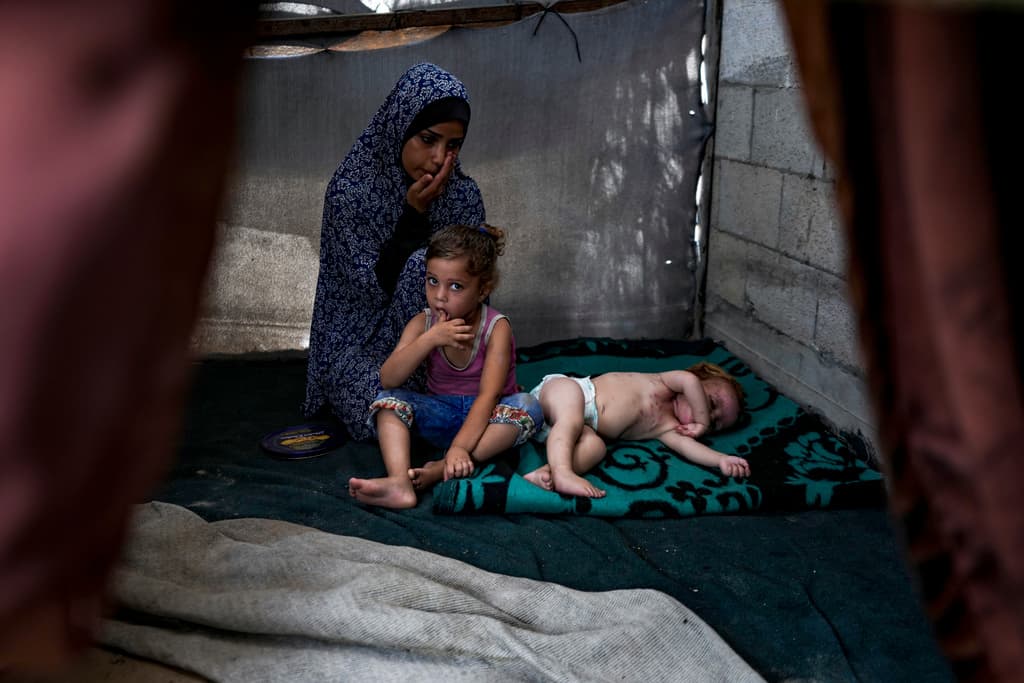Mom, let me sleep in your arms. I don't want to die.
Six-year-old Yasmine clings to her mother in the family tent in al-Mawasi in southern Gaza Strip, designated as a so-called safe zone in the brutal war between Israel and Hamas.
My children are afraid to fall asleep, explains Safa Abu Yasin to AFP.
At night, she shares a thin mattress with her four daughters. Often, she doesn't sleep at all. Four-month-old Loujain keeps her awake.
We want her to feel safe, but I don't even have a crib where she can calm down, says Abu Yasin about her youngest daughter.
Awake – to be able to flee
In Gaza's overcrowded tent camps, the nights are filled with horrors. The war has deprived hundreds of thousands of people of what they need for sleep: privacy, darkness, silence, and the ability to control the temperature. In the tents, winter is icy cold and summer is scorching.
Many ask for sleeping pills to endure the nights, says Eman Alakhras, a psychologist at the aid organization Doctors of the World, to AFP.
There are those who cannot sleep because they don't want to die. Many have seen people die in front of their eyes and they feel they must be awake, so they can flee if danger arises.
Farah Sharshara misses her pillow. In the tent camp in Dayr al-Balah in central Gaza Strip, the nights are unbearable.
You have to always adapt to others, says the 32-year-old.
There are those who snore, those who wake up screaming, crying from fear. Then there are the sleepless who just talk and disturb everyone else.
Lice and scabies
Most of the area's approximately two million inhabitants have been forced to flee at least once during the war, according to the UN. Nearly 84 percent of the strip has been subject to Israeli evacuation orders at one or more times since the war started in October.
In the overcrowded tent camps, everything is in short supply, including clean water and soap. In the dirt, lice, scabies, and other skin diseases thrive, according to the World Health Organization WHO.
Sham al-Hussi cries when her mother tries to apply ointment to her rash-covered body.
It's terrifying. There are always flies on her face, says Manar al-Hussi to AP.
Rami, who, like many Gazans, has been forced to flee several times during the war, shares a six-by-four-meter tent with 26 relatives.
Before the war, we all had our own rooms. Now we sleep on a plastic mat, a blanket, and a foam mattress, he says to AFP.
More than 40,000 Palestinians in Gaza Strip have been killed since the war started, which followed a terrorist-stamped Hamas attack on Israel on October 7, 2023. The figures come from health authorities in Hamas-ruled Gaza.
Among the dead are nearly 300 aid workers, nearly 900 healthcare workers, and 170 journalists/media workers.
About 1.9 million people are displaced within Gaza Strip's borders, according to UN estimates. Many of them have been forced to flee multiple times.
Nearly half a million people in the area are estimated to be facing catastrophic levels of food shortages, according to the UN-supported IPC (Integrated Food Security Phase Classification).
One million children are estimated to be in need of psychological and psychosocial support, according to Unicef.
85 percent of all schools have been destroyed entirely or partially, according to the UN agency Ocha. The same applies to 20 out of 36 hospitals.
Source: Ocha: Reported impact snapshot – Gaza Strip, August 21, 2024






